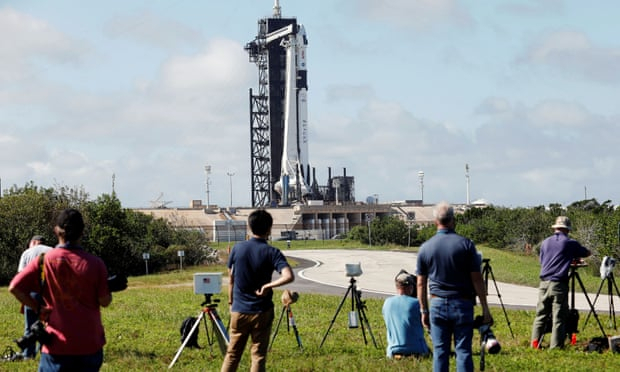The liftoff time slipped from Saturday to Sunday evening due to forecasts of gusty, onshore winds over Florida – remnants of storm Eta – that would have jeopardised a return landing for the Falcon 9 rocket’s reusable booster stage, Nasa officials said.
The Crew Dragon capsule, dubbed Resilience by its crew, was rescheduled for launch at 7.27pm on Sunday from Nasa’s Kennedy space centre in Cape Canaveral.
The crew for the flight to the International Space Station includes three American astronauts: Victor Glover, Shannon Walker and the mission commander, Mike Hopkins, a US air force colonel who is to be sworn into the fledgling US space force once on board the ISS.
The fourth crew member is the Japanese astronaut Soichi Noguchi, making his third trip to orbit after flying on the US space shuttle in 2005 and a Russian Soyuz spacecraft in 2009.
The journey to the space station – lengthened from about eight hours to a little over a day by the new launch time – is considered SpaceX’s first “operational” mission for the Crew Dragon.
A test flight of the vehicle to and from the space station with two crew on board in August marked the first space flight of Nasa astronauts launched from US soil in nine years, following the end of the shuttle program.
Nasa officials only just signed off on Crew Dragon’s final design earlier this week, capping a nearly 10-year development phase for SpaceX under the space agency’s public-private crew programme.
The advent of the Falcon 9 and Crew Dragon represents a new era of commercially developed space vehicles – owned and operated by a private entity rather than Nasa – being used to carry Americans into orbit.
“The history being made this time is we’re launching what we call an operational flight to the International Space Station,” said the Nasa chief, Jim Bridenstine.
Elon Musk, the head of SpaceX, usually attends high-profile launches in person but has tested positive for coronavirus. Whether Musk came into contact with the astronauts was unclear but unlikely since the crew has been in routine quarantine for weeks prior to the flight.
Nasa contracted SpaceX and Boeing in 2014 to develop space capsules to replace the shuttle and end US dependence on Russian to carry US astronauts to orbit. Boeing’s first crewed test mission with its Starliner capsule is planned for late 2021.
















































